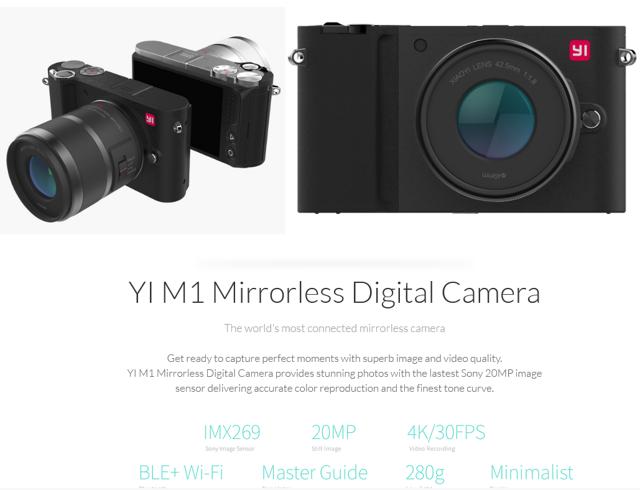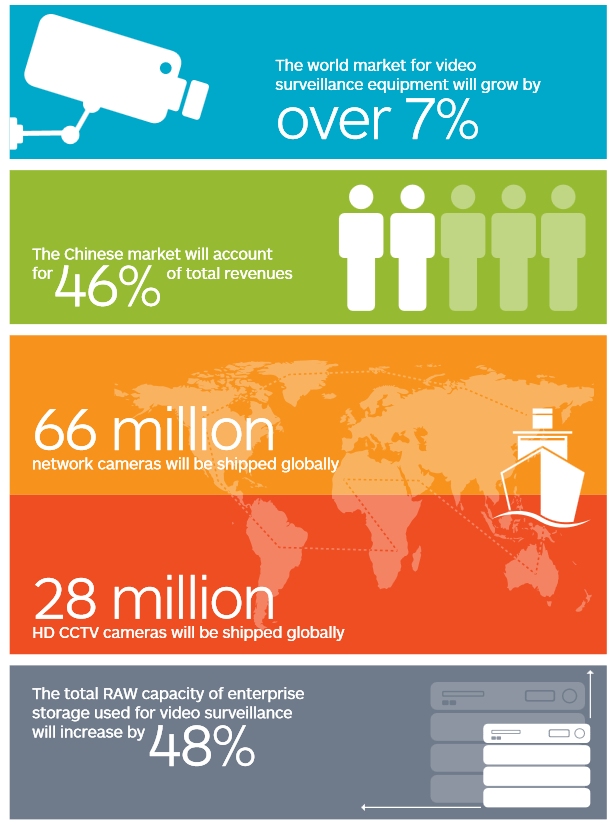The Photokina 2016 event is already over. One of the most intriguing products unveiled in Photokina is the first mirrorless camera made by Xiaomi-backed Xiaoyi. The Yi M1 is a Micro Four Thirds mirrorless camera with a 20-megapixel Sony (NYSE:SNE) IMX269 image sensor. Amazon (NASDAQ:AMZN) is already taking pre-orders for the Xiaomi Yi M1 mirrorless cameras. It can record 4K videos at 30fps.
The $330 Xiaomi Yi M1 sure looks like a Leica T-series viewfinder digital camera. Even the Yi red logo has a Leica-vibe to it. Sony's image sensor business has derivative benefits from Xiaomi's unfettered ability to copy the design of other famous brands. People and photographers who can't afford the pricey price tags of a Leica now has the option to just buy Xiaomi's clone product.
 Click to enlarge
Click to enlarge
(Source: Xiaoyi)
I also bet that the Y1 M1 will take much better pictures and 4K videos than the iPhone 7 Plus or the Leica-tagged Huawei P9 Android smartphone. My point is that compact digital mirrorless cameras still have a niche market that Xiaomi found worth engaging in.
Why It Matters
Since the Yi M1 is being sold outside China, I am confident that Sony will do brisk business supplying its image sensors to Xiaomi/Xiaoyi. Xiaomi's Yi action sports camera also (made by Xiaoyi) used a Sony image sensor. The design win inside Xiaomi's first mirrorless camera further fortifies Sony's leadership position (35% market share) in the $10.5 billion/year image sensor market.

(Source: Yole Development)
The threat of Xiaomi cannibalizing Sony's mirrorless camera sales is minor. Sony will most likely still lead in the mid-range and high-end mirrorless camera segments. Xiaomi's Yi M1 will cater to customers who can only afford sub-$500 digital cameras.
Nevertheless, Xiaomi is a world-famous brand that could make immediate impact on the mirrorless camera market led by Sony, Olympus (OTCPK:OCPNY), Canon (NYSE:CAJ), and Panasonic (OTCPK:PCRFY). Xiaomi's smartphone business is now surpassed by Huawei, Oppo, and Vivo. Xiaomi therefore has compelling reason to try and make it big in the digital camera market.
Unlike the race-to-the-bottom competition in the Android smartphone business, there is much fewer companies involved in digital cameras. Moreover, Sony has to be aggressive in winning new clients for its image sensors. Camera sales leader Canon announced last month that it will finally sell its proprietary CMOS sensors to any interested third-parties.
Sony has every reason to make sure that Canon's new ambition to become a supplier of image sensors for cars, robots, and other smart devices does not prosper. Canon should remain a 4%-share player in the image sensor market.
Xiaomi releasing a $330 mirrorless camera also reduces the total addressable market of Canon's new compact EOS M5 mirrorless camera, which sells for $1,099. Anything or any company that helps Sony reduce the commercial appeal of Canon's mirrorless cameras is a positive development.
I also want to point out that the Xiaomi Yi M1 is compatible with all lenses that uses the Micro Four Thirds (NYSE:MFT) mount. This makes it appealing to amateur and professional photographers who already own a bunch of MFT lenses. It has a Sony sensor so it will definitely produce pro-level image and video quality. Sony and Nikon (OTCPK:NINOY) (who also uses Sony image sensors) have the top-rated camera sensors based on DxOMark tests.
Other Opportunities for Sony's Image Sensors
Lastly, Sony also supplied its IMX377 image sensor inside the Yi II 4K action camera. I look forward to Sony eventually also supplying image sensors to Xiaomi/Xiaoyi next-generation of home surveillance cameras. I believe that Sony's top-rated image sensors also have a fat opportunity in the growing demand for video surveillance cameras.
Xiaomi's management will likely continue its push on video surveillance cameras. It knows that the entire video surveillance market is estimated to grow to a$71.22 billion industry by 2022. According to IHS, China, the home country of Xiaomi, will account for 66% of global video surveillance camera revenue this year. Sony's top-rated image sensors deserve to be used inside the estimated 28 million HD CCTV cameras that will be shipped out this year. CIPA said only 13 million interchangeable-lens cameras (mirrorless and DSLR) were shipped out last year.
The surveillance camera market is therefore a bigger opportunity for Sony's image sensors.

(Source: IHS)
Sony unveiled its STARVIS CMOS sensor for surveillance cameras last year. Going forward, Xiaomi might become the first customer for STARVIS. The superior night mode or low-light performance of STARVIS could make Xiaomi surveillance cameras more attractive to security-conscious home and industrial CCTV customers.
 Click to enlarge
Click to enlarge
(Source: Sony)
Conclusion
Putting the Sony IMX269 inside Xiaomi's first mirrorless digital camera could help Sony increase its market share in the global image sensor industry. Xiaomi has established itself as a consistent vendor of top-quality, but budget-friendly products. My fearless forecast is that Xiaomi could probably sell more mirrorless cameras than Japanese firms Sony, Canon, or Nikon in China. The more Xiaomi sells its mirrorless and action cameras, the better it is for Sony.
I rate SNE as a Buy. I recommend CAJ and NINOY as Sell. Canon and Nikon were greatly outpaced by Sony in terms of image sensor technology development. Sony still has the best technology in camera and mobile image sensors. Even Apple (NASDAQ:AAPL) used Sony sensors on the front and rear cameras of its new iPhone 7 smartphones. Samsung (OTC:SSNLF) also touts a top-rated mobile image sensor technology in its ISOCELL product. However, Apple still went to Sony for its iPhone 7 camera sensor requirements. The more iPhone 7 sales there are the better it is for Sony.
Disclosure: I am/we are long SNE, AAPL, AMZN.
I wrote this article myself, and it expresses my own opinions. I am not receiving compensation for it (other than from Seeking Alpha). I have no business relationship with any company whose stock is mentioned in this article.
Editor's Note: This article covers one or more stocks trading at less than $1 per share and/or with less than a $100 million market cap. Please be aware of the risks associated with these stocks.
Source: Sony Helps Xiaomi Compete In The Mirrorless Camera Market
No comments:
Post a Comment